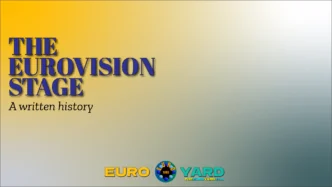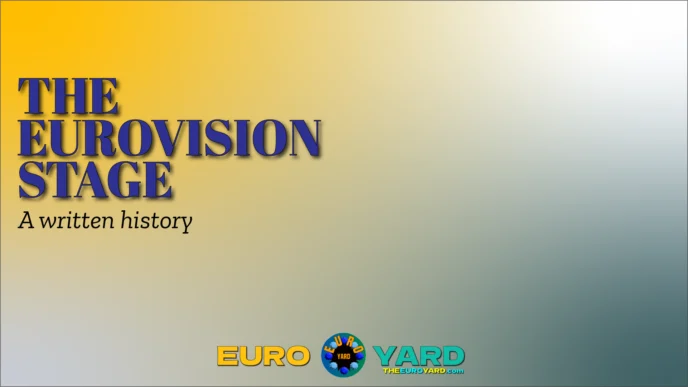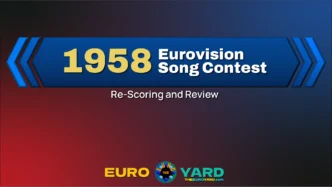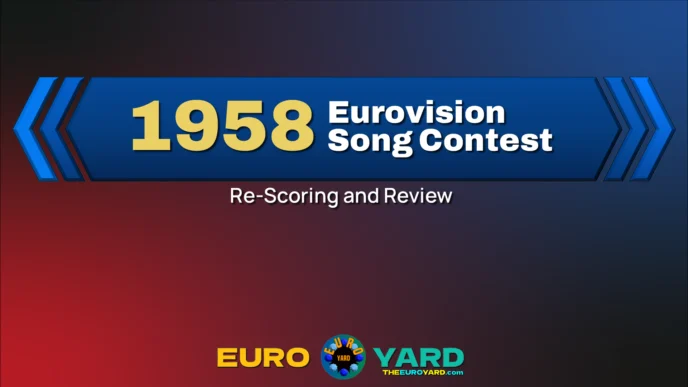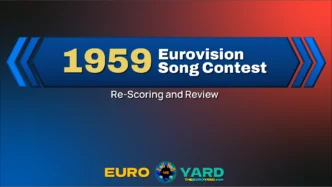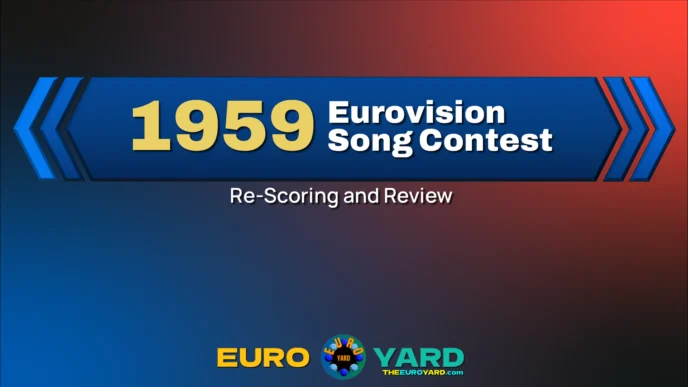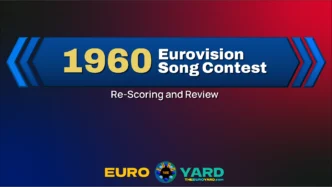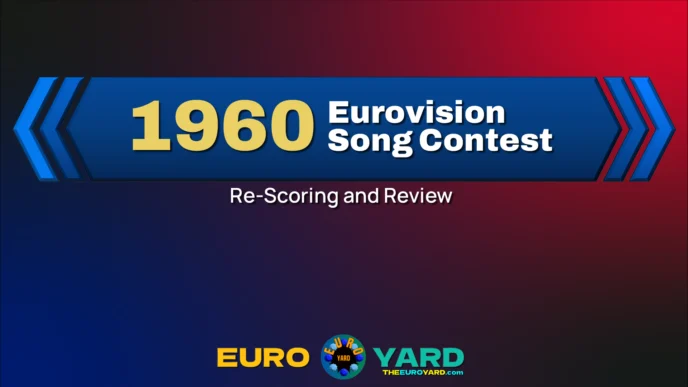We know who won the Eurovision Song Contest 1957, but does this website agree with that call? Find out all this and more in our review of the second grand prix de la chanson.
By year two, Eurovision started to take on more character. It also brought us a few notable changes and instances to the shape and form of the contest. However, while all of that is nice, you need to know who won, and did the right country win? I have the answers you seek.
PLEASE NOTE: As of March 2025, the rankings below are obsolete. To view the updated rankings for the 1957 contest, please visit this article.
Primer: Eurovision Song Contest 1957
Eurovision came to Germany in 1957, or West Germany to be specific (East Germany, for obvious reasons, would not be part of the proceedings until the 1990s). The contest grew from seven countries in 1956 to ten this year, and was the first in which each country had just one shot to win. As you may recall, in 1956, each country had two performances, which could be by the same or different singers.
Some major firsts in 1957 include:
- This was the year of the first victory for The Netherlands.
- First appearances of Austria, Denmark, and the United Kingdom, the latter meaning the first Eurovision song performed in English.
- First act to use a prop as an element of the performance (Germany).
- Germany also gave us the first multilingual song.
- There was the first act performed as a duet (Denmark).
- Denmark also featured the first kiss at Eurovision – but certainly not the last.
- First “Europe Calling” announcement of the jury votes live at the end of the show.
- Juries could not vote for their own country (shocking that you could even do this for one year).
There were time limits on the length of songs, but clearly, these were not enforced. Italy’s Corde della mia chitarra was over five minutes long, which remains as of 2024 the longest song in Eurovision history. Even the winning song, Net als toen, was well over four minutes.
In the 1957 voting system, each country had 10 jurors that gave one point to their favorite song; a total of 100 points was awarded.
Eurovision Song Contest 1957: Tenth through Sixth
As a reminder, we score the top ten every year using the modern 12-10-8-1 system. As there were only ten entries this year, every country will get at least one point.
10th Place
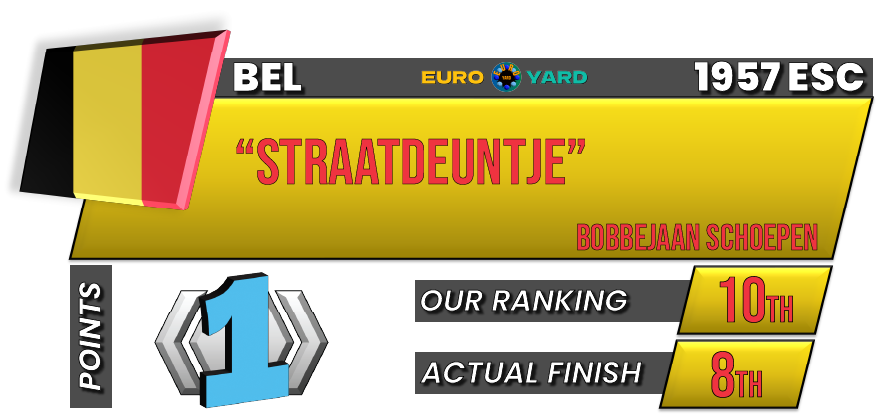
Coming in last place in our rankings was Straatdeuntje from Belgium, which also happened to be first in 1957’s running order. It finished in a tie for eighth place in reality.
I could not get there with this song, which translates to “street tune” from Dutch. Any Eurovision act that overuses whistling will suffer on my scorecard (and as a result, I will probably pan at least one modern Eurovision song that you may have liked – we will deal with that in a few decades). While the song was sweet enough, the vocals were not great and the whistling needed to stop. As such, this is the lowest-rated song we have had in the first two editions of the contest.
9th Place
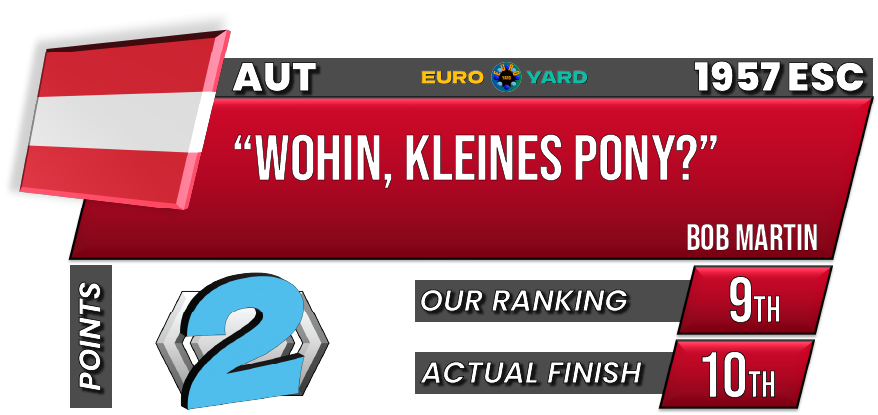
While the juries had Austria’s inaugural entry in last place in 1957, we gave Wohin, kleines Pony? a little more respect: second-to-last. You’re welcome.
Bob Martin’s song, which translates to “where to, little pony?,” was another one that was cute in terms of the lyrics, but did not make much of a mark. Most things that involve ponies tend to be cute, but as for winning Eurovision, maybe not. They could have played up the cuteness with a different singer, and maybe then it would have succeeded, but as it stood, this just did not work.
This song was performed fifth in the running order, right before the winning song.
8th Place
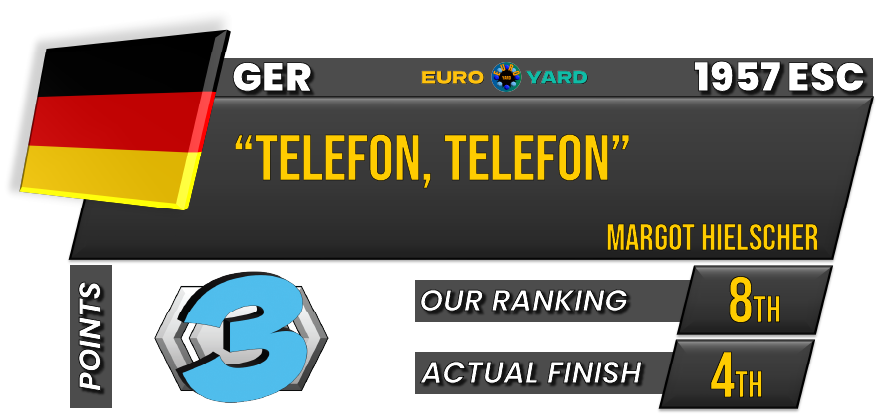
Somewhat of a disagreement here as we awarded three points (8th place) to Germany and Margot Hielscher’s Telefon, telefon. I don’t think I need to translate this title; you can figure it out for yourselves. This song went seventh in the running order.
I gave her extra points for what I will call her pioneering spirit: introducing props. Of course, the prop was a telephone, and Margot was the first person to ham it up with said prop on the Eurovision stage. I do not speak German (not yet, anyway) but even I knew from the context clues what the song was about: She’s waiting for her lover to call her. The song itself was fine, okay, decent, or any other similar word you would like to insert. Other than the telephone prop, there was not much exciting about it, especially when one has seen modern Eurovision Song Contests. Back then, however, I could see how this would be a big deal.
7th Place
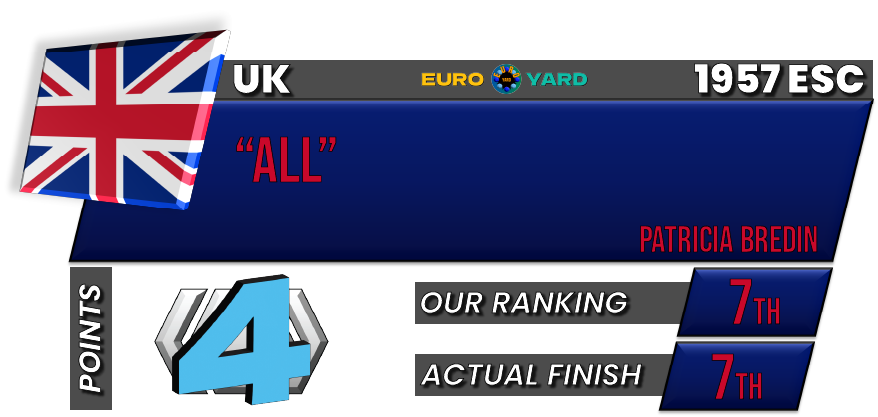
In seventh place, receiving 4 points from the Euro Yard jury, is All, the United Kingdom’s first entry, performed by Patricia Bredin. She performed third in the 1957 grand final.
Where this song succeeded was in the vocals. Bredin had a big, operatic voice, and she knocked it out of the park in that respect. Since I put a high value on vocal excellence, that got this song to a higher position than it otherwise would have, because the rest of it was middling at best. I did not care for the song itself, which was short and rather basic, and if she were not such a talented singer, this might have ended up somewhere like ninth.
6th Place
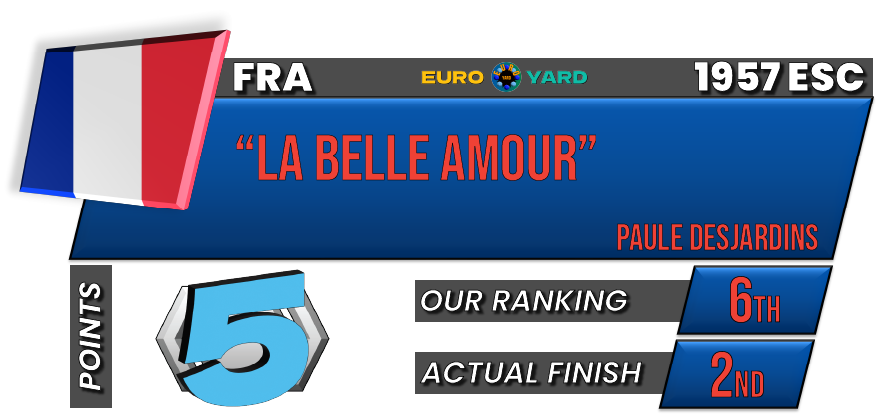
France’s entry, La Belle amour (“beautiful love”), was the source of one of very few sharp disagreements we had with the Eurovision Song Contest 1957 jury. They had it in second place (albeit a distant second), while we gave it sixth. That’s still better than where we had it on the first round of scoring with the old rubric.
It’s not that this song was bad per se, it just did not make a huge impression on me. I would classify it as relatively average, if I had to pigeon-hole it. Reading through the lyrics, again, the word “okay” comes to mind, if not a little better than okay. The juries disagreed with me, for sure, but I have watched this performance several times and it is not bad, but it is also not special.
1957 Top 5 Rankings
5th Place
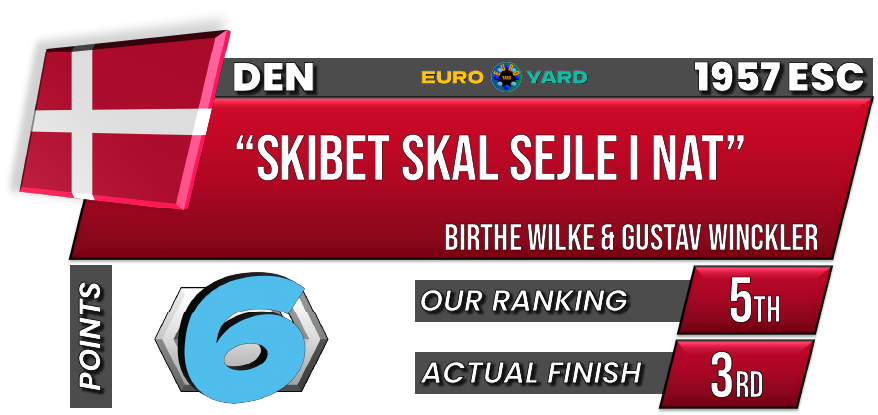
Denmark’s first ever entry, Skibet skal sejle i nat (“the ship must sail tonight”), was notable for the firsts outlined above. It was performed in the second-to-last position, ninth, and finished in the top three among the juries in 1957.
One does not have to speak Danish to figure out the plot of this story, and yes, this was in essence the first Eurovision song to tell a story between two people on stage, and one that used costumes to sell it. The male singer, who gave off some Bing Crosby crooner energy, was to sail away on a boat, and the female, his true love, was wishing him farewell. They met one another on his voyage and fell in love. I might have thought he was going off to war while watching the performance, but the lyrics do not explicitly give that away, just that they fell for each other but now he has to leave again. Of course, they smooched at the end, which I’m sure caused a bit of pearl-clutching in some European homes.
As inaugural entries went in 1957, this was the best of them.
4th Place
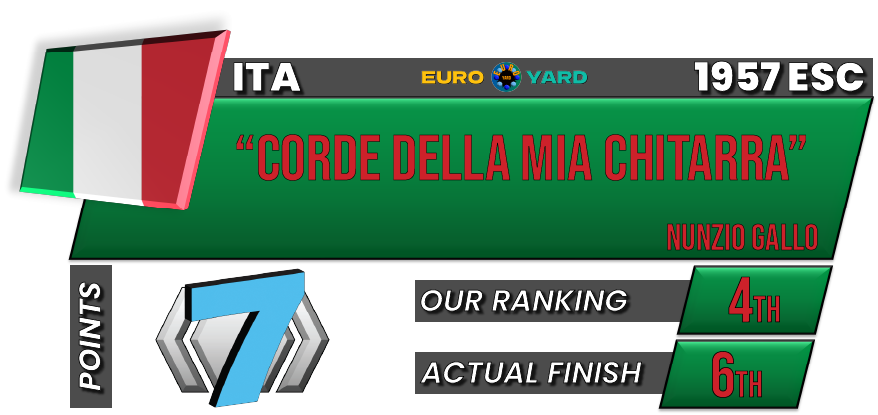
Our third-alternate from 1957 was Italy’s Corde della mia chitarra (“strings of my guitar”), performed by Nunzio Gallo. He won Sanremo in 1957 with this song, which featured its own first: a guitar solo. This song went on fourth in the grand final.
At one point, following the first watch of all the performances, I had this song in first place. In subsequent rewatches, it has slid into second, and fell a bit on the all-time scoreboard (without giving too much away, of course, because the Top 100 all-time rankings will be a future feature on Euro Yard – though I cannot promise this is there). On the new rubric re-watch, it has fallen to fourth. Gallo sang quite well and the guitar was a great touch; those points are not to be debated. My knock on this is that it was too long. As of 2024, as noted above, this is still the longest song in Eurovision history at just over five minutes, and will forever remain as such unless the three-minute rule goes away. The guitar solo was perhaps the only thing that made it feel like it was not dragging, but that by itself made this a groundbreaking performance.
3rd Place – Bronze Medal
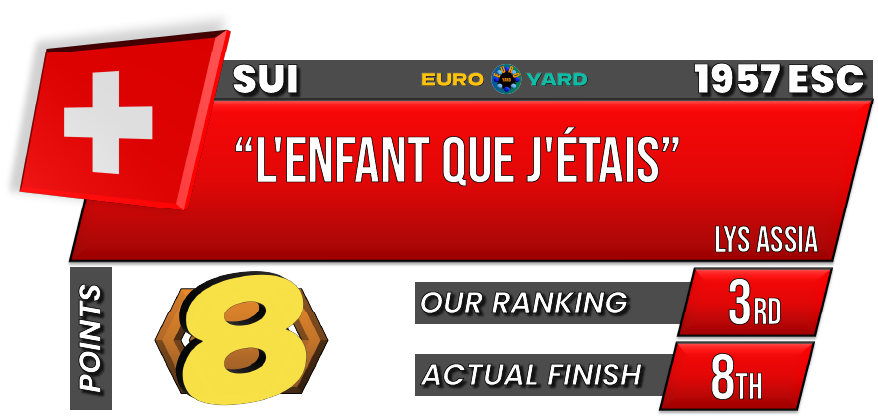
We gave the OG Eurovision winner, Lys Assia, third place in the Eurovision Song Contest 1957 rankings with L’Enfant que j’étais, which means “the child I was.” She finished near the bottom of the jury vote, however. Assia performed this song last on the evening, and all of the year’s top four finishers were directly behind her in the running order.
This song was not as good as either of her songs from 1956, but I still found it to be a solid effort. Assia had a beautiful voice, and had I been a fan of hers in her prime, I’d likely be enchanted if she sang the contents of the phone book to me. Lyrically, the song was not that special, but whatever she sang, she did well, and that would also be the case in her 1958 performance.
2nd Place – Silver Medal
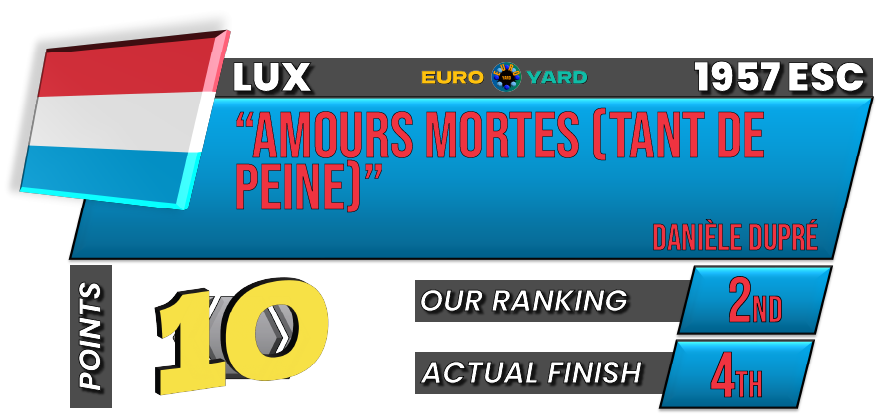
Our runner-up this year was Luxembourg and its entry, Amours mortes (tant de peine). Danièle Dupré performed second in the grand final, and the juries had her tied for fourth at the end of the evening.
The title of the song paints a gloomy picture: “Dead love (so much sadness).” However, it did not quite bring the room down, as the melody was relatively pretty and the vocals were average to above-average. Despite being about “dead love” and sadness, this was not a typical depressing song, at least as we might know them today. Not bad at all. Though it was in second place on our scorecard, it was well behind the winning song.
1st Place – Gold Medal
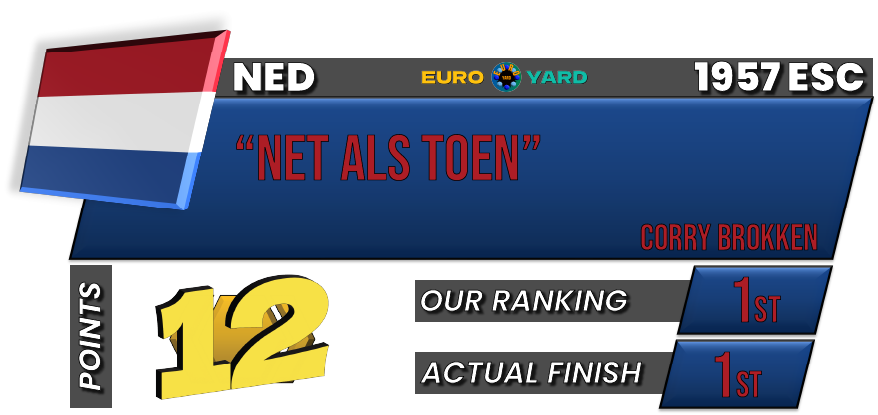
Corry Brokken, appearing in her second Eurovision, won in 1957 with Net als toen (“just like then”). Her song was performed in the middle of the contest in sixth position.
Like Italy’s number, this was also much longer than the average Eurovision entry, at about four and a half minutes long. The length is a criticism I have read from other Eurovision sources, but in my experience – and I have watched this contest several times – it does not feel exceptionally long to me because she sold it well. I have heard more modern Eurovision songs which were three minutes but felt like an eternity, whereas this one did not make me feel like I was laboring through the performance.
As mentioned in the 1956 scores, we stan Corry Brokken on Euro Yard. She played to the cameras and sang well, but the lyrics gave me something different. Other songs in 1957 were cute in a G-rated, corny way, but this was cute in a more pointed way. She is singing to her husband about, in essence, how the thrill is gone from the marriage, and he’s getting older and more plump, but she longs for that spark of love to come back “just like then.” This was a worthy winner.
Euro Yard All-Time Scoreboard: Through 1957
Clicking on the image enlarges it.
| Switzerland | 30 |
| Italy | 20 |
| The Netherlands | 19 |
| Luxembourg | 14 |
| France | 12 |
| Denmark | 6 |
| Germany | 6 |
| United Kingdom | 4 |
| Belgium | 3 |
| Austria | 2 |



